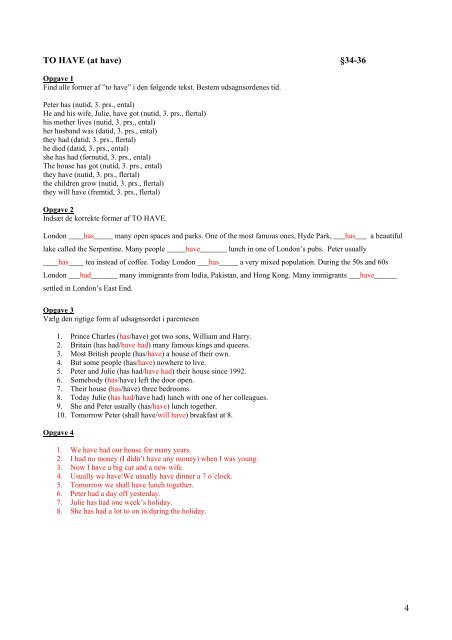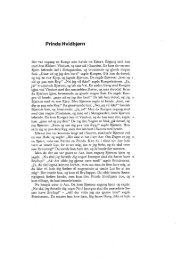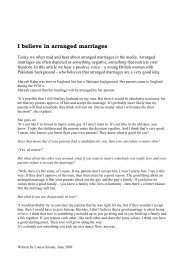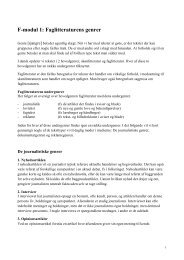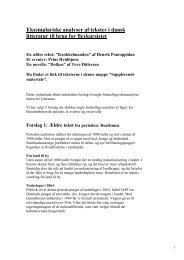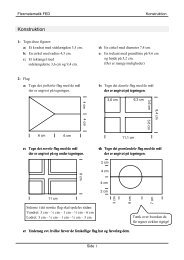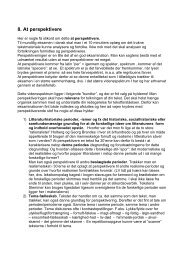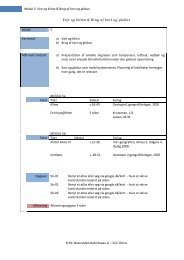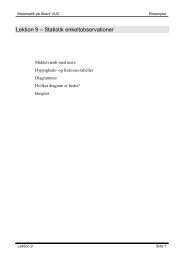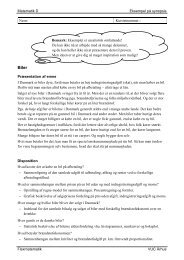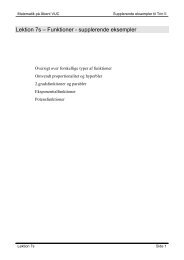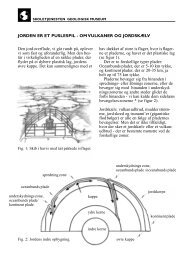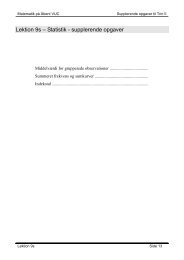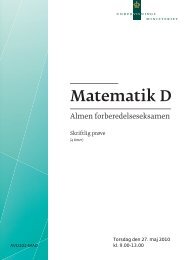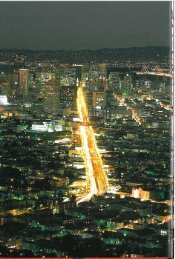Rettenøgle til Focus on Grammar
Rettenøgle til Focus on Grammar
Rettenøgle til Focus on Grammar
Create successful ePaper yourself
Turn your PDF publications into a flip-book with our unique Google optimized e-Paper software.
TO HAVE (at have) §34-36<br />
Opgave 1<br />
Find alle former af ”to have” i den følgende tekst. Bestem udsagnsordenes tid.<br />
Peter has (nutid, 3. prs., ental)<br />
He and his wife, Julie, have got (nutid, 3. prs., flertal)<br />
his mother lives (nutid, 3. prs., ental)<br />
her husband was (datid, 3. prs., ental)<br />
they had (datid, 3. prs., flertal)<br />
he died (datid, 3. prs., ental)<br />
she has had (førnutid, 3. prs., ental)<br />
The house has got (nutid, 3. prs., ental)<br />
they have (nutid, 3. prs., flertal)<br />
the children grow (nutid, 3. prs., flertal)<br />
they will have (fremtid, 3. prs., flertal)<br />
Opgave 2<br />
Indsæt de korrekte former af TO HAVE.<br />
L<strong>on</strong>d<strong>on</strong> ____has_____ many open spaces and parks. One of the most famous <strong>on</strong>es, Hyde Park, ___has___ a beautiful<br />
lake called the Serpentine. Many people _____have_______ lunch in <strong>on</strong>e of L<strong>on</strong>d<strong>on</strong>’s pubs. Peter usually<br />
____has____ tea instead of coffee. Today L<strong>on</strong>d<strong>on</strong> ___has_____ a very mixed populati<strong>on</strong>. During the 50s and 60s<br />
L<strong>on</strong>d<strong>on</strong> ___had_______ many immigrants from India, Pakistan, and H<strong>on</strong>g K<strong>on</strong>g. Many immigrants ___have______<br />
settled in L<strong>on</strong>d<strong>on</strong>’s East End.<br />
Opgave 3<br />
Vælg den rigtige form af udsagnsordet i parentesen<br />
1. Prince Charles (has/have) got two s<strong>on</strong>s, William and Harry.<br />
2. Britain (has had/have had) many famous kings and queens.<br />
3. Most British people (has/have) a house of their own.<br />
4. But some people (has/have) nowhere to live.<br />
5. Peter and Julie (has had/have had) their house since 1992.<br />
6. Somebody (has/have) left the door open.<br />
7. Their house (has/have) three bedrooms.<br />
8. Today Julie (has had/have had) lunch with <strong>on</strong>e of her colleagues.<br />
9. She and Peter usually (has/have) lunch together.<br />
10. Tomorrow Peter (shall have/will have) breakfast at 8.<br />
Opgave 4<br />
1. We have had our house for many years.<br />
2. I had no m<strong>on</strong>ey (I didn’t have any m<strong>on</strong>ey) when I was young.<br />
3. Now I have a big car and a new wife.<br />
4. Usually we have/We usually have dinner a 7 o’clock.<br />
5. Tomorrow we shall have lunch together.<br />
6. Peter had a day off yesterday.<br />
7. Julie has had <strong>on</strong>e week’s holiday.<br />
8. She has had a lot to <strong>on</strong> in/during the holiday.<br />
4


